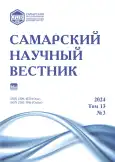Transformation of the dual-vector giftedness of preschoolers from the level of «natural gift» to the level of «ability»
- Authors: Kalinina L.Y.1
-
Affiliations:
- Samara State University of Social Sciences and Education
- Issue: Vol 13, No 3 (2024)
- Pages: 172-182
- Section: Pedagogical Sciences
- URL: https://journal-vniispk.ru/2309-4370/article/view/280759
- DOI: https://doi.org/10.55355/snv2024133307
- ID: 280759
Cite item
Full Text
Abstract
The expediency of appealing to the fundamental patterns of transformation of natural and social objects in explaining the transition of giftedness from the level of «natural talent» to the level of «ability» is substantiated. The issue of transformation of the little-studied phenomenon of «duo-vectoral giftedness» in the context of a broader concept of «giftedness» is considered. An attempt is made to reveal the mechanisms of changes in the natural gift of a child, the fundamental nature of which allows us to make an assumption about why the tendency of types of giftedness is natural to manifest itself not in a single field of activity, but remaining interconnected, forming stable duo-vector pairs. The author clarifies the concepts of «duo-vectorial talent», «natural talent», «duo-vectorial abilities». The interpretations of the concept «transformation» in cybernetics, biology, psychology, pedagogy are given in the perspective of the initial formulations and in the projection on the studied phenomenon of duo-vectorial giftedness, in its dynamics and various manifestations. They show: the absence of contradictions between the scientific substantiation of the emerging concept of transformation of duo-vectorial giftedness of preschool children and already known scientific concepts of the phenomenon of «transformation». Based on the materials of the article, the transformation of a child's natural gift into a duo-vector giftedness of the «ability» level is characterized as a process of behavior change based on the fundamental patterns of the existence of complex objects and guided by pedagogical technology, manifested in its transition to a qualitatively new level in two interrelated spheres.
Full Text
##article.viewOnOriginalSite##About the authors
Larisa Yurievna Kalinina
Samara State University of Social Sciences and Education
Author for correspondence.
Email: kalinina@sgspu.ru
candidate of pedagogical sciences, leading researcher of Scientific Research and Grants Department
Russian Federation, SamaraReferences
- О Стратегии научно-технологического развития Российской Федерации: указ президента РФ от 28.02.2024 № 145 [Электронный ресурс] // Гарант.ру. https://base.garant.ru/408618353.
- Whipple G.M. Classes for gifted children; an experimental study of methods of selection and instruction. Bloomington: Public School Publishing Company, 1919. 151 p.
- McPherson G.E., Blackwell J., Hallam S. Musical potential, giftedness, and talent development // The Oxford Handbook of Music Performance. 2022. Vol. 1. P. 31–55. doi: 10.1093/oxfordhb/9780190056285.013.3.
- Сергеева Б.В., Микерова Г.Ж., Затеева Т.Г., Гакаме Ю.Д., Мардиросова Г.Б. Модель развития математической одаренности младших школьников // Современные проблемы науки и образования. 2022. № 3. doi: 10.17513/spno.31841.
- Кемахлы Ш.Б. Одаренность в области математики // Научное обозрение. Педагогические науки. 2021. № 6. С. 10–14. doi: 10.17513/srps.2400.
- Мазниченко М.А., Садилова О.П., Мушкин В.Г., Мушкина И.А. Представления тренеров по дзюдо о диагностике, развитии и поддержке спортивной одаренности в раннем возрасте // Science for Education Today. 2022. Т. 12, № 2. С. 7–32. doi: 10.15293/2658-6762.2202.01.
- Dolas F. Metalinguistic awareness as an indicator of linguistic giftedness // Rivista di psicolinguistica applicata. 2023. Vol. XXIII, iss. 1. P. 65–77. doi: 10.19272/202307701004.
- Đorđević J.N. Developing methodology for identifying giftedness in visual art expression domain in preschool age // Science International Journal. 2023. Vol. 2, iss. 4. P. 179–179. doi: 10.35120/sciencej0204173d.
- Калинина Л.Ю., Иванов Д.В., Пудовкина Н.В., Серёгина Л.А., Синякина Е.В., Фритцлер Ю.Х. и др. Раннее выявление одаренности в условиях художественно-творческого процесса: монография. Ч. I / отв. ред. Л.Ю. Калинина, Д.В. Иванов. Самара: Артель, 2018. 160 с.
- Савенков А.И. Развитие детской одаренности в образовательной среде: монография. М.: Прометей, 2005. 199 с.
- Гуревич И.Б., Журавлев Ю.И. Математические и информационные аспекты исследования мозга // Вестник Российской академии наук. 2010. Т. 80, № 5–6. С. 503–513.
- Булыгин В.В. Жизнь и мышление с точки зрения логики // Глобальный научный потенциал. 2014. № 10 (43). С. 66–69.
- Жмуров В.А. Большая энциклопедия по психиатрии. 2-е изд. М.: Джангар, 2012. 864 с.
- Методологическое обеспечение преобразований в педагогике // Педагогика: учеб. пособие / под ред. П.И. Пидкасистого. М.: Педагогическое общество России, 1998. С. 55–61.
- Пушкарева Т.В. Педагогическое преобразование как необходимость совершенствования образовательной действительности // Преподаватель XXI век. 2016. № 2–1. С. 32–37.
- Piaget J.W.F. The psychology of intelligence. London: Routledge and Kegan Paul, 1950. 202 p.
- Платонов К.К. Структура и развитие личности / отв. ред. А.Д. Глоточкин. М.: Наука, 1986. 255 с.
- Колесов С.Г. Теория деятельности и поведение // Актуальные проблемы гуманитарных и естественных наук. 2013. № 2. С. 295–297.
- Рубинштейн С.Л. Основы общей психологии. СПб.: Питер Ком, 1999. 720 с.
- Беликов В.А. Образование. Деятельность. Личность. М.: Академия Естествознания, 2010. 339 с.
- Богоявленская Д.Б. Психология творческих способностей: учеб. пособие. М.: Академия, 2002. 320 с.
Supplementary files






